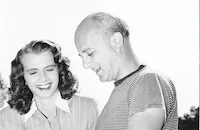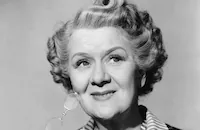Annabel Takes a Tour

Brief Synopsis
Cast & Crew
Lew Landers
Jack Oakie
Lucille Ball
Ruth Donnelly
Ralph Forbes
Frances Mercer
Film Details
Technical Specs

Synopsis
When movie star Natalie Preston outscores her rival Annabel Allison in a popularity contest, Annabel's publicist, Lanny Morgan, decides that drastic measures are needed to revive his client's career. Consequently, on a good will tour to promote Annabel's latest movie, Lanny, as a stunt, uses the calling card of Viscount Ronald River-Clyde to send flowers to Annabel. Sure that the flowers are legitimate, Annabel, who previously lamented Natalie's marriage to a count, calls the viscount at his hotel room and insists that they have a rendezvous. At first confused, the viscount, who is a proper married man, is convinced by Lanny to indulge Annabel as a way of securing publicity for his new novel. Lovestruck, Annabel states her intention to give up show business and go off with the viscount, but the clever Lanny talks her into making one last appearance before her adoring public. After announcing her retirement and introducing the viscount, a woman and child rush the movie theater stage and declare that they are the viscount's wife and child. Annabel soon sees through the ruse, but then is forced to confront the real Mrs. River-Clyde and her four children, who appear with papers and lawyers. With Lanny and the studio head in tow, Annabel flees to the train station, followed by the angry viscount and his family. Both parties get on the same train, but the caboose in which Annabel and company are hiding detaches en route and rolls off into the sunset.

Director

Lew Landers
Cast

Jack Oakie

Lucille Ball

Ruth Donnelly

Ralph Forbes

Frances Mercer

Donald Macbride

Alice White
Pepito
Chester Clute
Jean Rouverol
Clare Verdera
Edward Gargan
Tommy Bupp
Virginia Dabney
Crew
Russell Bennett
Joe Bigelow
Olive Cooper
Albert D'agostino
Bert Granet
Bert Granet
Lou Lusty
Lee Marcus
Harry Marker
Russell Metty
Van Nest Polglase
Renié
Sam Ruman
Earl A. Wolcott

Film Details
Technical Specs

Articles
Annabel Takes a Tour
During Annabel's national promotional tour for her latest film to Buffalo and Chicago, Wonder Studios re-hires the aggressive, take-no-prisoners studio publicist Lanny Morgan (Jack Oakie) who will get his clients press by any means necessary.
After a disaster-plagued trip in which Annabel falls through a stage trap door, Lanny sees his perfect opportunity to grab Annabel some attention. Romance novel-writing British Viscount Ronald River-Clyde (Ralph Forbes) is staying on the same hotel floor and through Lanny's machinations, appears to "woo" Annabel with flowers and crates of champagne. While the royalty-obsessed Annabel swoons over the handsome, reclusive Viscount, Lanny concocts a brazen plan to have every reporter in the area make them the couple of the moment. But Annabel is so under the Viscount's spell, she contemplates leaving show business altogether for him.
The second in the Annabel screwball comedies, after The Affairs of Annabel (1938), this fast paced yarn benefits greatly from Lucille Ball's comic gifts. The New York Times fawned over Ball, calling her, "one of our brightest comediennes." Writing in Lucille: The Life of Lucille Ball Kathleen Brady notes, "In Annabel Takes a Tour she demonstrates her gift for physical comedy as she rises from a three-point landing on elbows and nose. She has total conviction in her role and plays it without a trace of farce."
Garson Kanin, who directed Ball in her next film Next Time I Marry (1938), said of the actress in Brady's book, "She was extremely inventive to the point I was surprised she didn't want to write. Like most good actresses, she did not like to be directed. She didn't need to be. She was her own self. It has to be carefully remembered that there are stars and there are actresses. Movies are just interested in great personalities. I think Lucy was a great, great personality. She was an individual, and that's what got her going at the time."
RKO planned to make more Annabel movies but dumped the series when Jack Oakie asked for $50,000 for each film. A 1924 letter from Ball to Oakie recreated in his book Jack Oakie's Double Takes recounts their amiable on-set relationship. In the letter Ball opens, "Dearest Jackie Boy" and tells Oakie, "most of all, I remember your sense of humor, your creative know-how and how much I learned from working with you, for which I shall be ever grateful."
Ball's newly risen film stature was attributable to her appearance in the very successful ensemble picture Stage Door (1937) alongside Katharine Hepburn and Ginger Rogers which led to her signing with, "Zeppo Marx, the Marx brother who had dropped out of the comedy act in 1933 to become an influential agent. He drove her salary up to $1,000 a week and negotiated for better billing in B movies" (from Stefan Kanfer's Ball of Fire: The Tumultuous Life and Comic Art of Lucille Ball).
"I soon became known as 'Queen of the B's'" joked Ball in her autobiographical Love, Lucy. She considered an appearance early in 1938 on the weekly radio program, "The Wonder Show," a great boost in her comic training. She appeared alongside such notable comics of the time as Jack Carson, Al Pierce, Jack Haley and Phil Baker. "This gave me a name in the trade as a good feminine foil. I could flip a comedy line, which a lot of actresses couldn't do. In radio I couldn't depend upon props or costumes or makeup; I had to rely on timing and tone of voice for comic effects, and this was invaluable training."
Riding high on her post-Stage Door success in B-pictures, Ball also hired a maid named Harriet McCain she heard on a radio program call-in show who proved a faithful companion for twenty three years and copious trips around the world.
Producer: Lou Lusty
Director: Lew Landers
Screenplay: Bert Granet (screenplay and story); Olive Cooper (writer); Joe Bigelow (story)
Cinematography: Russell Metty
Art Direction: Albert D'Agostino, Van Nest Polglase
Music: Robert Russell Bennett (uncredited)
Film Editing: Harry Marker
Cast: Jack Oakie (Lanny Morgan), Lucille Ball (Annabel Allison), Ruth Donnelly (Josephine 'Jo'), Bradley Page (Howard Webb, Chief of Wonder Pictures), Ralph Forbes (Viscount Ronald River-Clyde), Frances Mercer (Natalie Preston), Donald MacBride (Thompson, RR Conductor), Alice White (Marcella, Hotel Manicurist), Chester Clute (Pitcarin, Rodney-Marlborough Hotel Manager), Jean Rouverol (Laura Hampton).
BW-68m. Closed Captioning.
by Felicia Feaster

Annabel Takes a Tour
Quotes
Annabel's fallen in love!- Josephine
She can't do that. It's not in her contract.- Howard Webb
Trivia
Notes
Annabel Takes a Tour was the second and final film to use Charles Hoffman's "Annabel" character. Many of the contributors on this production also worked on the first "Annabel" film, The Affairs of Annabel ( listing). Hollywood Reporter production charts add Jack Arnold, Cecil Kellaway, William Corson and Rita Gould to the cast, but their participation in the final film has not been confirmed. According to modern sources, RKO planned to produce more "Annabel" movies, but were inhibited from doing so because Jack Oakie wanted $50,000 for his acting services per film. Modern sources add the following cast members: Wesley Barry (Bellhop), Rafael Storm (Count) and Mary Jo Desmond.














